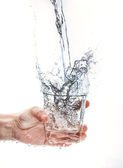Although we are all susceptible to dehydration, older adults are at a greater risk. The normal aging process changes the body’s water composition and the ability to recognize thirst decreases with age. This compounded with a chronic illness and medications can put a person at an increased risk. Older adults living alone or even in a care facility tend to eat less and may sometimes forget to eat or drink. The fear of incontinence can cause an individual to drink less.
Some signs of dehydration include:
- dry mouth and nose
- chapped lips

- a red, inflamed tongue
- dry skin
- sudden confusion
- increased tiredness or weakness
- skin that lacks its normal elasticity and resilience when pinched
- falling
- constipation
- nausea and vomiting
- dark urine
- low blood pressure
Dehydration can lead to serious complications including infections, swelling of the brain, seizures, low blood volume shock, kidney failure, coma and death.
Fluid intake is critical, so plan ahead to make sure you or your loved one are properly hydrated. You will want to identify medications that may cause fluid loss (water pills), keep water bottles available throughout the day, and drink frequently throughout the day rather than drinking large amounts at one time. It is important to talk with your doctor to determine the level of fluid consumption that is appropriate for each person because certain illnesses and conditions can affect the amount of fluids a person can tolerate.